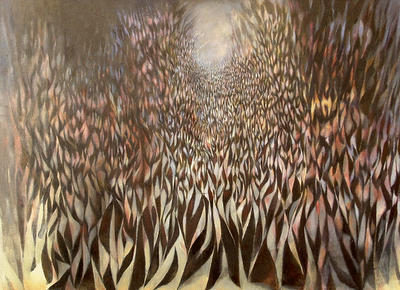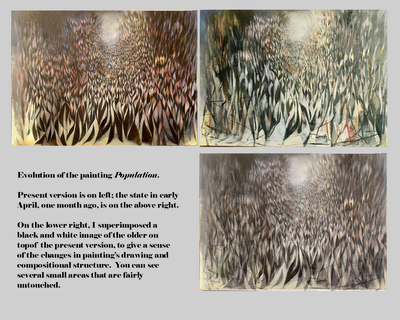 Population, oil on canvas aprox. 37" by 50". (c) 2006 Jamie Bollenbach All rights reserved.
Population, oil on canvas aprox. 37" by 50". (c) 2006 Jamie Bollenbach All rights reserved.This is two or three months of difficult work, done very inefficiently, without planning sketches: a technical summary of the last four years, either the beginning or end of something. Horror vacui if ever there was - but the operational idea is simply spatial shapes transforming into shapes with figurative referents. There is a lot of deep space and compositional movements across the collections of shapes. With no model, it's somewhat emotionless in execution, although it should be unsettling in terms of where the viewer is, and whether the subject really has anything to do with a person, or a landscape. Primarily, it pushes the evolution of these marks into the horizon, into darkness, into grey space until they disappear. The vision's desire to resolve these into people keeps the eye moving, scanning, so that it is difficult to see the piece as a single image. That means the image must be "read" over a period of time rather than recognized as a solitary symbol.
I'm interested in the way a painting can specifically portray time by direct manipulation of images, and surface properties, which imply time, and relate to the passage of time in the making of the image itself: the strange balance of paintings, particularly portraiture, that photograhy or paintings of photography tend to lack.
Influential to this was a desire to do the equivalent of treating a Willem DeKooning in three dimensions, with something like real light (but without a distinct source.) Related work, but not directly influential, is with early Marcel Duchamp, the Futurists, cubism (well, that covers both the fascists and the communists) in the attempt to tackle time, and surrealist Yves Tanguy with precise surface qualities of unreal objects: an objective treatment of the non-objective.
Collection of the Artist. Available.


